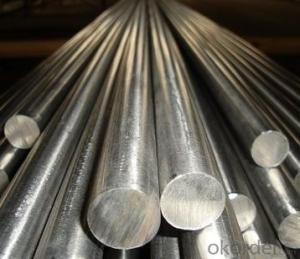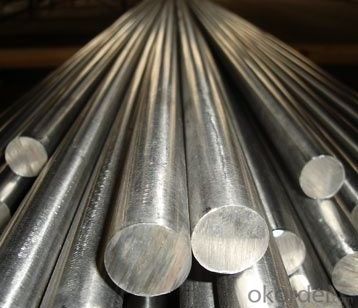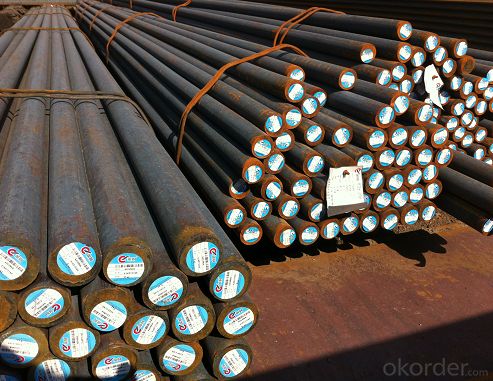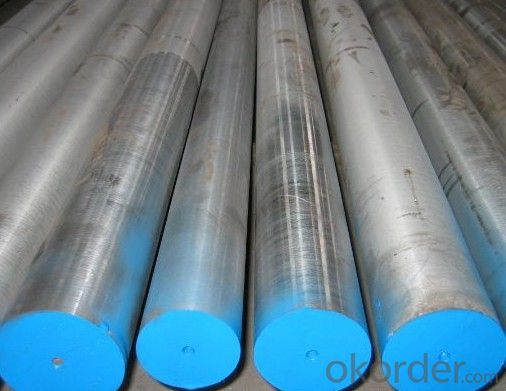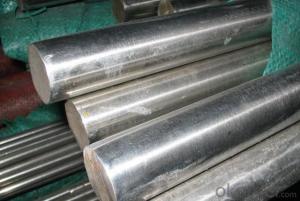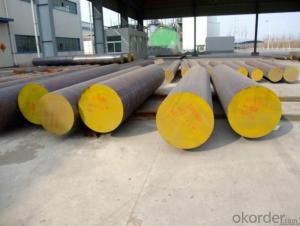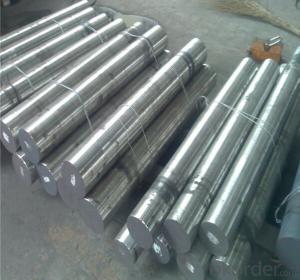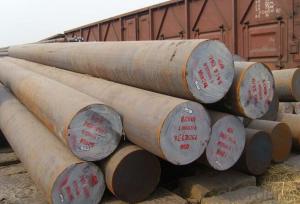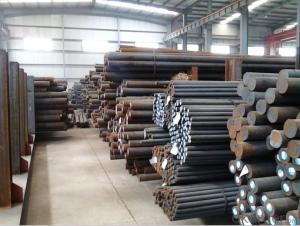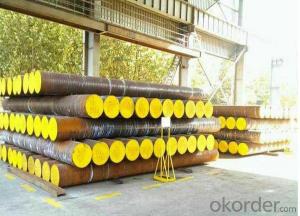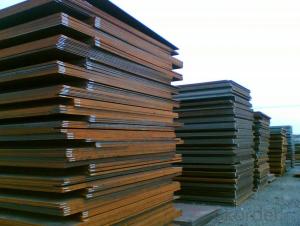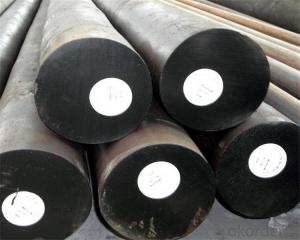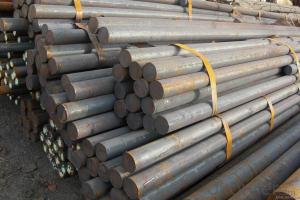Alloy Steel ASTM D2 Special Steel Carbon Steel
- Loading Port:
- China main port
- Payment Terms:
- TT OR LC
- Min Order Qty:
- 25 m.t.
- Supply Capability:
- 10000 m.t./month
OKorder Service Pledge
OKorder Financial Service
You Might Also Like
Specification
Chemical Composition(%)
| Country | Standard | C | Si | Mn | Cr | Mo | V | S | P | Other |
| China(GB) | Cr12Mo1V1 | 1.40-1.60 | ≤0.60 | ≤0.60 | 11.0-13.0 | 0.70-1.20 | ≤1.10 | ≤0.030 | ≤0.030 | Co≤1.00 |
| USA(ASTM) | D2 | 1.40-1.60 | 0.30-0.50 | 0.30-0.50 | 11.0-13.0 | 0.70-1.20 | 0.8 | ≤0.025 | ≤0.025 | Co:0.60 |
| Germany(DIN) | 1.2379 | 1.50-1.60 | 0.10-0.40 | 0.15-0.45 | 11.5-12.5 | 0.60-0.80 | 0.90-1.10 | ≤0.030 | ≤0.030 | - |
| Japan(JIS) | SKD11 | 1.40-1.60 | ≤0.40 | ≤0.60 | 11.0-13.0 | 0.80-1.20 | 0.20-0.50 | - | - | Ni≤0.50 |
Available Size
| Rolled flat steel | 12-90mm×205-610mm×L |
| Forged flat steel | 100-300mm×400-600mm×L |
Characterstics
| 1.High hardening ability and quench-hardening performance | ||||||
| 2.High abrasive resistance | ||||||
| 3.Good oxidation resistance at elevated temperatures | ||||||
| 4.Less deformation after heat treatment |
Applications: suitable for various complicated cold working dies with high precision and long lifetime,such as punching dies,cold extrusion dies,thread rolling dies,screw plates,cold extrusion dies,and precise measuring devices


1, Your advantages?
professional products inquiry, products knowledge train (for agents), smooth goods delivery, excellent customer solution proposale
2, Test & Certificate?
SGS test is available, customer inspection before shipping is welcome, third party inspection is no problem
3, Payment Terms?
30% TT as deposit and 70% before delivery.
Irrevocable L/C at sight.
4, Trading Terms?
EXW, FOB, CIF, FFR, CNF
6, After-sale Service?
We provides the services and support you need for every step of our cooperation. We're the business partner you can trust.
For any problem, please kindly contact us at any your convenient time.
We'll reply you in our first priority within 24 hours.
- Q: What are the different welding techniques used for special steel?
- There are several welding techniques used for special steel, including Tungsten Inert Gas (TIG) welding, Metal Inert Gas (MIG) welding, Shielded Metal Arc Welding (SMAW), and Flux-Cored Arc Welding (FCAW). Each technique has its own advantages and disadvantages, and the choice of technique depends on factors such as the type of special steel, the thickness of the material, and the desired outcome of the welding process. TIG welding is commonly used for high-quality welds on thin materials, while MIG welding is suitable for thicker materials and higher production rates. SMAW is a versatile technique, suitable for various steel types and thicknesses, and FCAW is often used for outdoor applications and on thick materials.
- Q: How does precipitation-hardening steel achieve high strength through heat treatment?
- Precipitation-hardening steel achieves high strength through heat treatment by a process called aging. After the steel is initially heat-treated, it is cooled quickly to form a supersaturated solid solution. This solution contains a high concentration of alloying elements. When the steel is reheated to a lower temperature, these alloying elements precipitate out, forming small particles within the steel matrix. These precipitates act as obstacles to dislocation movement, which in turn increases the strength of the steel. The size, distribution, and density of these precipitates can be controlled through the heat treatment process, allowing for the desired strength and hardness to be achieved in the final product.
- Q: What are the different pharmaceutical grades of special steel?
- There are various pharmaceutical grades of special steel that are specifically designed and produced to meet the stringent requirements of the pharmaceutical industry. These grades are used in the manufacturing of equipment, instruments, and components that come into direct contact with pharmaceutical products. The different pharmaceutical grades of special steel include: 1. 316L Stainless Steel: This grade is widely used in pharmaceutical applications due to its excellent corrosion resistance and high purity. It is often referred to as surgical stainless steel and is suitable for parts that require frequent cleaning and sterilization. 2. 304 Stainless Steel: This grade is also commonly used in the pharmaceutical industry for its corrosion resistance and ease of fabrication. It is suitable for equipment and components that do not require as frequent cleaning or sterilization. 3. Duplex Stainless Steel: This grade offers a combination of high strength and corrosion resistance, making it suitable for applications where durability and reliability are key. It is often used in pharmaceutical processing equipment that handles aggressive chemicals or high-pressure environments. 4. Hastelloy: This is a nickel-based alloy that exhibits superior resistance to corrosion, heat, and chemicals. It is commonly used in pharmaceutical applications where extreme conditions are present, such as in reactors or vessels that handle highly corrosive substances. 5. Titanium: Although not technically steel, titanium is often considered a pharmaceutical-grade material due to its excellent biocompatibility and corrosion resistance. It is used in medical implants and devices, as well as in pharmaceutical equipment that comes into contact with sensitive drugs. These pharmaceutical grades of special steel are carefully selected based on their specific properties and suitability for pharmaceutical applications. They are manufactured and tested to ensure compliance with industry standards and regulations, such as Good Manufacturing Practices (GMP) and the United States Pharmacopeia (USP). Using the appropriate grade of steel in pharmaceutical manufacturing helps to ensure product safety, quality, and integrity.
- Q: What are the different methods for improving the creep resistance of special steel?
- Several methods exist to enhance the creep resistance of special steel. One commonly employed technique involves alloying. By incorporating specific alloying elements like chromium, molybdenum, and vanadium, the steel's creep resistance can be significantly improved. These alloying elements create stable carbides or nitrides that serve as obstacles to dislocation movement, thereby reducing the rate of creep deformation. Heat treatment represents another effective approach. By subjecting the steel to carefully controlled heating and cooling processes, the microstructure can be refined to enhance its creep resistance. Techniques such as quenching and tempering aid in the formation of a fine-grained structure, which in turn increases the steel's strength and resistance to creep. Surface modification offers an alternative means of improving creep resistance. Nitriding and carburizing techniques can be utilized to introduce nitrogen or carbon into the steel's surface layer, creating a hardened layer that enhances creep resistance. Moreover, grain size control can be achieved through methods like grain boundary engineering or severe plastic deformation. By refining the grain structure, the movement of dislocations within the material is impeded, resulting in improved creep resistance. Lastly, the application of coatings can also bolster the creep resistance of special steel. Coatings such as ceramic or metallic coatings provide a protective layer that hampers the diffusion of impurities and slows down the creep rate. To summarize, the improvement of creep resistance in special steel can be accomplished through various techniques, including alloying, heat treatment, surface modification, grain size control, and the use of coatings. These methods aim to fortify the steel's microstructure, hinder dislocation movement, and establish protective barriers against creep deformation.
- Q: How does special steel contribute to the electronics industry?
- Special steel contributes to the electronics industry by providing highly durable and corrosion-resistant materials for the manufacturing of various electronic components. It is used in the production of connectors, circuit boards, magnetic cores, and other critical parts of electronic devices. Its unique properties enhance the performance, reliability, and longevity of electronic products, ensuring efficient functioning and reducing the risk of failures.
- Q: How does special steel contribute to sustainability efforts?
- Special steel contributes to sustainability efforts in several ways. Firstly, special steel is known for its durability and longevity. It has a high resistance to corrosion, wear, and tear, which means it can withstand harsh environments and heavy usage. This durability extends the lifespan of products made with special steel, reducing the need for frequent replacements. By minimizing the consumption of resources and reducing waste generation, special steel helps conserve natural resources and minimize environmental impact. Additionally, special steel is highly recyclable. It can be melted down and reprocessed multiple times without losing its properties or quality. This makes it a valuable material in the circular economy, where resources are reused and recycled to reduce dependence on virgin materials. The recycling process for special steel requires less energy compared to producing steel from raw materials, resulting in lower greenhouse gas emissions and energy consumption. Furthermore, special steel is often used in energy-efficient applications. For example, it is used in the production of wind turbines, which generate renewable energy. By providing a material that can withstand the demanding conditions of wind turbines, special steel contributes to the expansion of clean energy sources. This helps reduce reliance on fossil fuels, decrease carbon emissions, and mitigate climate change. Lastly, special steel plays a crucial role in the transportation sector. It is used in the manufacturing of lightweight, fuel-efficient vehicles, such as electric cars. By reducing the weight of vehicles, special steel helps improve fuel efficiency and decrease greenhouse gas emissions. Additionally, special steel is used in the construction of infrastructure for electric vehicle charging stations, supporting the transition to cleaner transportation systems. In conclusion, special steel contributes to sustainability efforts by promoting durability, recyclability, energy efficiency, and clean energy generation. Its properties and applications help conserve resources, reduce waste, and mitigate climate change, making it an important material in creating a more sustainable future.
- Q: Can special steel be used in the electronics industry?
- Yes, special steel can be used in the electronics industry. It is often utilized for manufacturing various components and tools in electronic devices due to its desirable properties such as high strength, corrosion resistance, and thermal conductivity.
- Q: What are the different types of heat-resistant steel?
- There are several different types of heat-resistant steel, including austenitic stainless steels, martensitic stainless steels, ferritic stainless steels, and nickel-based alloys. These materials are specifically designed to withstand high temperatures and maintain their strength and integrity in extreme heat environments.
- Q: What are the different international standards for special steel?
- There are several international standards for special steel, including the American Society for Testing and Materials (ASTM) standards, the International Organization for Standardization (ISO) standards, and the European Standards (EN) standards. These standards define the chemical composition, mechanical properties, and testing requirements for various types of special steel, ensuring quality and consistency in their production and usage worldwide.
- Q: What are the different methods for shot peening special steel?
- The fatigue strength and performance of special steels can be improved through the widely used method of shot peening. Different methods exist for shot peening special steel, each with its own advantages and considerations. One method is air shot peening, which involves propelling small steel shots at high speeds using compressed air. This method is commonly used and effective for treating large surfaces and achieving uniform coverage. However, it may not be suitable for delicate or highly sensitive materials. Another method is wheel shot peening, where steel shots are propelled using a rotating wheel. This method offers better control and accuracy, making it effective for treating small or intricate parts such as gears and shafts. Wet shot peening is a method performed in a wet environment, typically using a mixture of water and shot media. It provides increased control over shot flow and reduces dust formation. This method is preferred for special steels sensitive to heat or at risk of distortion. Ultrasonic shot peening is an advanced method that utilizes high-frequency vibrations to propel the shot media onto the steel surface. It offers enhanced control over shot velocity and impact energy, resulting in improved surface finish and fatigue life. It is particularly useful for thin or delicate special steels. Laser shot peening employs laser pulses to generate shockwaves on the steel surface, creating compressive residual stresses. This method is highly precise and can be controlled to treat specific areas or patterns. It is commonly used for special steels requiring localized treatment or with complex geometries. The selection of the shot peening method depends on various factors, including the type of special steel, component geometry, required surface finish, and desired residual stress profile. Consulting with shot peening experts or engineers is essential to determine the most suitable method for shot peening special steel.
Send your message to us
Alloy Steel ASTM D2 Special Steel Carbon Steel
- Loading Port:
- China main port
- Payment Terms:
- TT OR LC
- Min Order Qty:
- 25 m.t.
- Supply Capability:
- 10000 m.t./month
OKorder Service Pledge
OKorder Financial Service
Similar products
Hot products
Hot Searches
Related keywords
